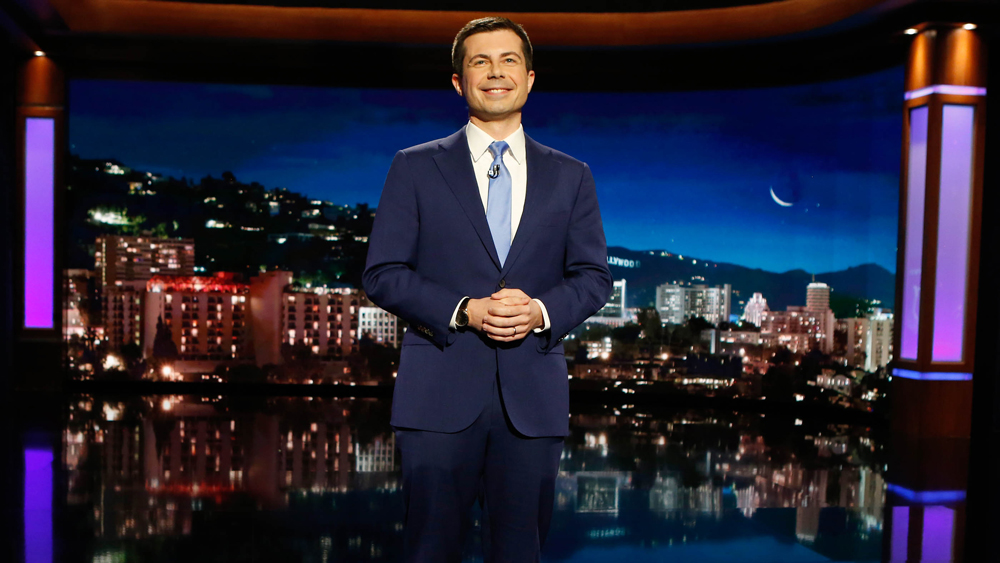Pete Buttigieg on ‘Jimmy Kimmel Live’ and the Vacuum of Leadership on TV (Column)
By Daniel D’Addario
LOS ANGELES (Variety.com) – The months ahead may put — more strongly than in our lifetimes so far — the adage “the show must go on” to the test, and may indeed break it for good. One example: Pete Buttigieg’s booking as the guest host of “Jimmy Kimmel Live” just as talk shows began their process of shedding audiences before shutting entirely for an indefinite period in the midst of the coronavirus crisis.
Buttigieg, the former Democratic presidential hopeful, was booked before the crisis roared into its current phase. He gamely took part in an attenuated show, one with a small audience comprised of “Kimmel” staffers and Buttigieg entourage members, all whooping as loud as they could to make up for the empty chairs between them.
But “gameness” is not always a virtue. Buttigieg seemed vaguely embarrassed as he, late in his monologue, ran through B-level material about his wardrobe, insisting he hadn’t written it. His embarrassment came for the wrong reasons: Because it was prickling at his ego, not because for a man who was a week ago trying to run the country trying to stay in our consciousness in this moment, in this way felt vaguely disgraceful. Otherwise, he seemed preternaturally at home on TV, flexibly melding himself to the material the show wrote for him: He got a little ahead of himself when ranting at guest Patrick Stewart about his “Star Trek” fandom, but blandly chuckled while listening to Stewart talking about his own socialist leanings.
Elsewhere, Buttigieg attempted to re-litigate the early Democratic primaries — not ideologically but simply along the lines that his just desert had been taken from him. (He joked that he was “40 years too young and 38 years too gay,” and outfitted Kimmel’s house band in merch from his now-over campaign.) A taped bit early in the show featured Buttigieg blusteringly interviewing for a job at a Wetzel’s Pretzel’s and finding himself unsuited to deal with the store’s brash manager didn’t even feel worth prying apart its bizarre class and racial dynamics: Who, right now, cares about this? At a moment of unique tension, here was someone who’d spent many months insisting he could lead us trying, instead, to stay in the national consciousness as a comic persona. Buttigieg’s line that he’s closer than he thinks to Sarah Palin performing “Baby Got Back” this past week on “The Masked Singer” felt less like a joke, by monologue’s end, than a prophesy.
Buttigieg did address the nature of the moment, but only through the emptiest of platitudes: “The only way we’re going to get through this crisis is with unity,” he asked the audience of staffers. “So who’s with me?” He also instructed viewers to “Tell your doctors and representatives now is the time for action” (in what direction, for a confused and dizzy populace, remained unclear) and exhorted: “Believe me when I say the resolve of our nation is strong.” Perhaps the reason we were meant to believe him was that he was on TV and we weren’t — no other proof of expertise on the matter seemed to come from the man who went right back to talking about himself.
“The show must go on,” as Buttigieg’s top spokesperson Lis Smith
tweeted out
before he took the stage, implies that distraction is more powerful than that from which we’re being distracted; it can practically mean that ego is more powerful than shame. After all, though television had, throughout the Obama years, been a tool used in order to convey specific policy proposals or ideas in their moment, it is now an end in itself, even for those who’d deny they are trying to follow the tone seeping down from the top. In a less glaring but still somewhat embarrassing moment from the weekend before this uniquely bad week in American life, former candidate Elizabeth Warren went on “Saturday Night Live” to talk about how she’d received a bad deal from a public that didn’t turn out for her; her decision not to endorse a presidential candidate was treated, here, as not just her right (which it is) but as brave and revenge on the system (which is debatable, and also a tiresome way to go out). The sketch was garishly unnecessary as the capper on a campaign centered around the idea of a sort of self-sacrificing expertise: What mattered, when all was said and done, was media exposure as self-care, even (indeed, especially) as it meant keeping the candidate in the spotlight with absolutely nothing to say.
Perhaps there’s something to the fact that the person currently seen as the frontrunner for the Democratic nomination, like his evident runner-up, is not just far from a natural at being on camera but fairly uninterested in taking part in the entertainment apparatus. It’s hard to imagine that voters are making up their minds along these lines, or that they are rejecting the me-first ethos of a President still — for now — popular enough to define his base’s understanding of the ongoing story. Ease at working the levers of TV power, for now, has only brought an electoral benefit to the media star currently steering the U.S. response to the coronavirus pandemic. But, for Buttigieg, the “Kimmel” gig may represent its own reward — a hollow victory at a moment when he might have used his megaphone to offer something that actually felt like leadership.

